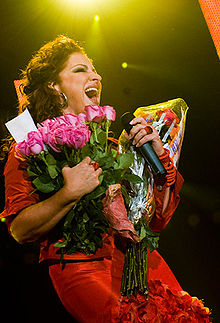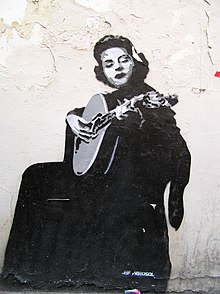Women in Latin music
The earliest musicians were Native Americans, hundreds of ethnic groups across the continent, whose lyrics "reflect conflict, beauty, pain, and loss that mark all human experience."
Latin music had a primarily male presence; men discriminated against women, limiting them to singing or dancing and discouraging them from becoming instrumentalists, writers, composers, arrangers, and executives.
As radio formats explore genres popularized and led by men, such as reggaeton and regional Mexican, women on the Billboard Latin music charts are periodically absent.
[6] The first inhabitants of Latin America settled 30,000 years before the arrival of Italian explorer Christopher Columbus at the peak of native cultural diversification into simple and complex societies.
[7] These societies included sedentary agricultural tribes and hunter gatherers,[7] who sang prayers to a deity asking for prosperity[5] with lyrics of "conflict, beauty, pain, and loss that mark all human experience" and music reflecting their understanding of the universe.
[8] They had "intricate ways of explaining the relationships between the sound, social organization, time, and the sacred",[8] and their rituals included dramatized performances of mythology vocalizing their view of creation.
[39] The rural Cuban genre guajira offered a musical identity to Afro-Cubans;[40] Albita Rodriguez became popular, and was named one of the top 100 personalities of the 20th century by Newsweek magazine.
[45] Modern merengue (a party genre) lyrics explored the "vicissitudes of urban life [and] employed skillful wordplay and humorous double entendres about women and sex.
[63] Only a handful of female Tejano singers, including Chavela Ortiz, Lisa Lopez, Patsy Torres, Laura Canales, and Elsa García, were successful in the genre before it became popular.
[88] The mid-2000s decline of women in regional Mexican music slowed, with greater representation by Graciela Beltran, Yolanda Perez, Los Horóscopos de Durango, Diana Reyes, and Jenni Rivera.
[28] Reggaeton singer Ivy Queen addressed concerns in her 2003 single, "Yo Quiero Bailar", which confronts sexual accessibility; dancing suggestively with a man does not necessarily mean that she wants to sleep with him.
[95] Most reggaeton songs "[circumscribe women] to dancing and fulfilling male sexual desire", which "eliminates almost all possibility of action and translates their presence into a prize or trophy that men exhibit, dominate, and manipulate.
"[94] In Ivy Queen's song, "Chika Ideal", the singer introduces her female friend to "the dance floor to satisfy her man's fantasies and answer (with her body) each time he wants to call her.
"[112] Other Latin pop musicians popular in Puerto Rico during the 1980s include Conchita Alonso, Maggy, Lunna "Cheo" Feliciano, Sophy Hernandez, and the Argentine duo Pimpinela.
[113] In mainstream pop, female musicians Mariah Carey,[114] Debelah Morgan,[115] Jessica Simpson, Celine Dion, Carole King, Tina Arena, Gloria Gaynor, Alexia, Jennifer Rush, Lara Fabian, Madonna, Laura Pausini,[116] Beyoncé, Selena Gomez,[117] Demi Lovato, Azealia Banks, Ariana Grande, and Toni Braxton[118] often record Spanish-language versions of their songs.
"[119] Her winning song, "Génesis", expressed "extreme male melancholy"; author Licia Fiol-Matta called Benitez a "masculine female" whose delivery "unexpectedly delivered this affect home.
[119] Women remain a minority in Puerto Rican music, although singers Myrta Silva, Ruth Fernandez, Ernestina Reyes, and La Calandria have achieved moderate success.
[122] The 1989 single "Virginidad Sacudida" by Mexican hardcore punk band Secta Suicida Siglo explores sexual repression among women, challenged heterosexism in Latin music, and opposed refraining from premarital sex for fear of being called a prostitute.
[123] Other noteworthy rockeras include Ely Guerra,[124] Camila Moreno,[125] Erica Garcia,[126] Christina Rosenvinge,[127] Eva Amaral,[128] Zayra Alvarez,[129] Francisca Valenzuela,[130] Mon Laferte[131] and Nicole.
[135] Female singers such as Mariza,[136] Mísia, Mafalda Arnauth, Dulce Pontes, Cristina Branco, Joana Amendoeira, Raquel Tavares, Yolanda Soares and Kátia Guerreiro have reinvigorated modern fado.
[138] Other Portuguese female singers (Felipa Pais, Marta Dias, Sofia Varela, Anabella, Bevinda, Sara Tavares, Cesaria Evora, Maria João, Marisa Monte, and Lura) have attained moderate success in the country.
[143] They list Elis Regina, Gal Costa, Marisa Monte, Silvia Torres, Belô Velloso, and Fernanda Porto as examples of the sizable roster of women in Brazilian music.
[26] American musicologist Ilan Stavans credits Selena, Jenni Rivera, Jennifer Lopez, Ivy Queen, Julieta Venegas, and Ely Guerra for the visibility of women in Latin music.
[26] NPR named Maluca, Bomba Estereo, La Lupe, Gloria Trevi, Chavela Vargas, Tita Merello, as "las mostras, fierce women of Latin music.
"[147] According to Latina, singers Rita Moreno, Selena, Gloria Estefan, Celia Cruz, Shakira, and Jennifer Lopez "changed the world" with their work, achieved "more and [gave] more.
[154] Billboard executive director of Latin content and programming Leila Cobo wrote that the public perception of regional Mexican music is a group of men dressed as cowboys.
[156] Early in 2009 Jennifer Lopez ended the drought with "Qué Hiciste" (number one for a week), followed by Gloria Estefan's "No Llores" and Fanny Lu's "Y Si Te Digo".
[158] The report found that the last female soloist topped the US Hot Latin Songs chart four years earlier: Shakira, with Maná (a male rock en español group), singing "Mi Verdad".
[158] Billboard executive Leila Cobo found that three of the seven women were veterans (Gloria Trevi, Thalía, and Ednita Nazario), and another three were deceased (Selena, Jenni Rivera, and Natalie Cole.
[160] Her collaboration with Prince Royce on "Solo Yo" was the first number-one single on the Latin Pop Songs chart by a woman since Jennifer Lopez' "Ven A Bailar" (2011) with Pitbull.














